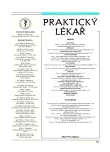-
Medical journals
- Career
Infantile autism from the point of view of developmental psychopathology. Theory of the psychological basis of autism
Authors: D. Krejčířová
Authors‘ workplace: Subkatedra klinické psychologie IPVZ, vedoucí PhDr. J. Ženatý
Published in: Prakt. Lék. 2005; 85(10): 562-568
Category: Of different specialties
Overview
The article presents an overview of the main contemporary theories of the fundamental psychological deficit in infantile autism (the theory of mind, central coherence, impairment of executive functions, nonverbal learning disability) in the context of developmental psychopathology. Emotional / motivational theories and attempts at the integration of both approaches are discussed. As an example of integrative theory is outlined the theory of intersubjectivity as a complex of emotional, motivational and cognitive dispositions needed for a normal social development. The consequences of an early impairment of intersubjectivity typical for young children with autism and their implications for the planning of therapeutic interventions and educational approaches, are described.
Key words:
infantile autism – developmental psychopathology – psychological base of autism – cognitive, motivational and integrative theories – intervention.
Labels
General practitioner for children and adolescents General practitioner for adults
Article was published inGeneral Practitioner

2005 Issue 10-
All articles in this issue
- Internistic aspects of combined hormonal contraception
- Recent view on the pathophysiology and pharmacotherapy of the depressive disorder
- Immunoadsorption therapy: Present-day options and perspectives
- Infantile autism from the point of view of developmental psychopathology. Theory of the psychological basis of autism
- Hypotension after ACE inhibitors in heart failure and acute myocardial infarction
- Rickettsia conori – infection imported from the South African Republic
- Surgical treatment of laryngeal carcinoma
- Phototherapy
- The unfolding image of the physician in fairy tales and myths
- General Practitioner
- Journal archive
- Current issue
- Online only
- About the journal
Most read in this issue- Infantile autism from the point of view of developmental psychopathology. Theory of the psychological basis of autism
- Recent view on the pathophysiology and pharmacotherapy of the depressive disorder
- Rickettsia conori – infection imported from the South African Republic
- Immunoadsorption therapy: Present-day options and perspectives
Login#ADS_BOTTOM_SCRIPTS#Forgotten passwordEnter the email address that you registered with. We will send you instructions on how to set a new password.
- Career

